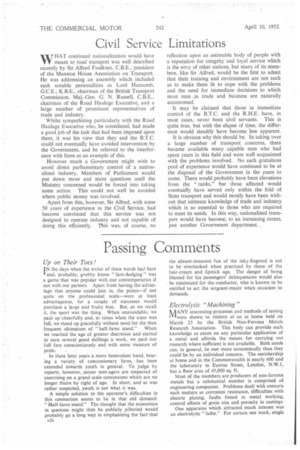Civil Service Limitations
Page 28

If you've noticed an error in this article please click here to report it so we can fix it.
WHAT continued nationalization would have meant to road transport was well described recently by Sir Alfred Faulkner, C.B.E., president of the Mansion House Association on Transport. He was addressing an assembly which included such notable personalities as Lord Hurcomb, G.C.E., K.B.E., chairman of the British Transport Commission, Maj.-Gen. G. N. Russell, C.B.E., chairman of the Road Haulage Executive, and a large number of prominent representatives of trade and industry.
Whilst sympathizing particularly with the Road Haulage Executive who, he considered, had made a good job of the task that had been imposed upon them, it was his view that they and the B.T.C. could not eventually have avoided intervention by the Government, and he referred to the interference with fares as an example of this.
However much a Government might wish to avoid direct parliamentary control of a nationalized industry, Members of Parliament would put down more and more questions until the Ministry concerned would be forced into taking some action. This could not well be avoided where public money was involved.
Apart from this, however, Sir Alfred, with some 50 years of experience in the Civil Service, had become convinced that this service was not designed to operate industry and not capable of doing this efficiently. This was, of course, no reflection upon an estimable body of people with a reputation for integrity and loyal service which is the envy of other nations, but many of its members, like Sir Alfred, would be the first to admit that their training and environment are not such as to make them fit to cope with the problems and the need for immediate decisions to which most men ,jn trade and business are naturally accustomed.
It may be claimed that those in immediate control of the B.T.C. and the R.H.E. have, in most cases, never been civil servants. This is quite true, but with the elapse of time, the difference would steadily have become less apparent.
It is obvious why this should be. In taking over a large number of transport concerns, there became available many capable men who had spent years in this field and were well acquainted with the problems involved. No such gratuitous pool of experience would have continued to be at the disposal of the Government in the years to come. There would probably have been elevations from the "ranks," but those affected would eventually have served only within the fold of State transport and would mostly have been without that intimate knowledge of trade and industry which is so essential to those who are required to meet its needs. In this way, nationalized transport would have become, to an increasing extent. just another Government department. ,




















































































